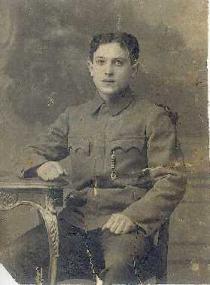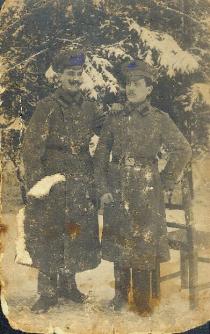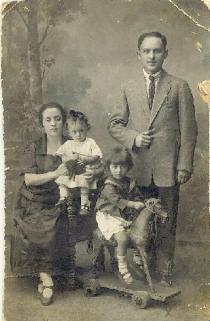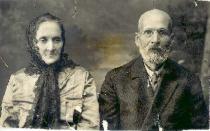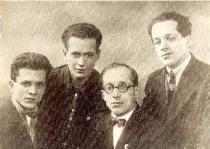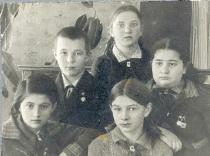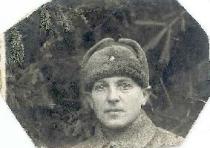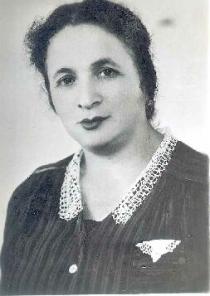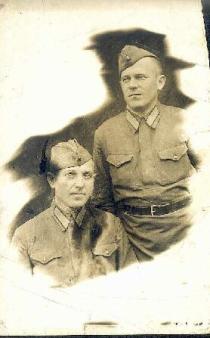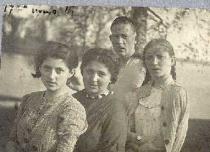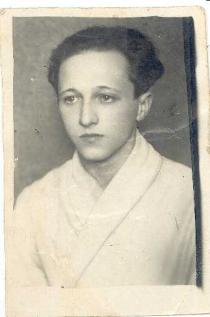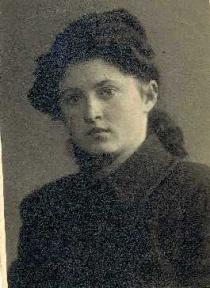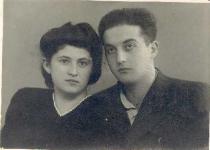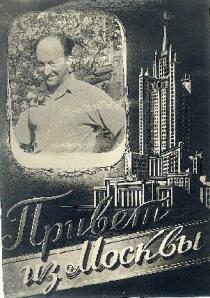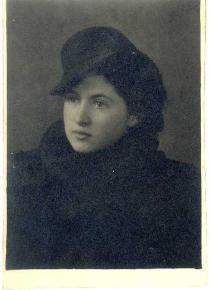
Rebecca Isaakovna Levina is a cheerful and elegant woman of 80 years of age, who doesn’t look like she is 80.
She is calm and reasonable, and that helps her to judge many events soberly, she has her own view on the history of her country and her own opinion about present times.
Rebecca is a linguist, that’s why she tells her family stories in a good literary language: with no omissions and choosing her words carefully.
She was always interested in the history of her family, and together with her husband she created a special genealogical album,
where they collected family photos and wrote comments.
This album helps us a lot during our conversation, which takes place in a cozy three-room apartment,
situated in a high building in one of the city’s largest avenues.
My family background
I don’t know anything about my great-grandfathers and great-grandmothers, neither on my mother’s, nor on my father’s side. I know nothing about where they lived, or what they were.
My mother’s mother was called Gishe-Rache; in Russian, apparently, this is the complex name Ghita-Raya, or Raissa Isaakovna Kaem as a whole 1. My grandfather, Abram Samuelovich Linov, was born in 1871 in Western Belarus. In the old days, there was the Pale of Settlement 2, and Jews could live in big cities or in the central part of Russia only if they were merchants of some definite Guild [actually, they had to be merchants of the First Guild 3], or craftsmen, or, if they were baptized and started to observe Christianity. Otherwise, they all lived in Western Belarus and Poland, which was part of Russia at that time.
My grandparents got to know each other and got married, apparently, still in Belarus, for they came to Bologoye [300 kilometers south of St. Petersburg] together with their children. That was before the Revolution 4, some time in the 1910s.
My grandmother was a housewife; she was a very determined, very particular, very serious woman, and Grandfather was a very soft, calm and clever person. And, as we usually say, with a good sense of humor. They spoke Yiddish. They didn’t wear any special Jewish clothes. Grandfather wore a usual suit, nothing Jewish. Grandmother dressed in a regular dress, but she always wore a kerchief, usually a black one.
Grandmother had a sister, who lived in Vyshniy Volochek [350 kilometers north of Moscow]. She was a housewife too. Her husband worked, but I don’t know where and what he did. I have no idea, if she was religious, or not, I don’t know if they observed Sabbath or celebrated Jewish holidays.
My grandfather was a craftsman – a hat-maker. Bologoye was a railway station, there were plenty of railway workers, and Grandpa sewed railway uniform hats. He had his own business and a shop. Later, he built a large wooden house with four apartments. He lived there together with his wife, and after my mother got married, she lived there together with her husband and children too, and rented out the two other apartments. Later Grandfather sold the two apartments on the first floor and kept the two upper apartments for his family. We lived in one of them, and Grandfather and Grandmother lived in the other one. There was a Russian stove 5, electricity and kerosene in the house, but there was no water and no gas, of course. We didn’t have any kitchen garden either. We were definitely city dwellers.
When the Revolution started, Granddad closed his business and went to artel 6. That’s why the officials didn’t take his house away. In those times the authorities used to take houses too.
My grandfather had reasonably good relations with his neighbors. His pals were mainly Jews, but people came to order a hat, not paying attention to his nationality. Mainly, he worked for Russians, because Bologoye was a Russian town, there were not so many Jews.
I don’t think that Grandfather liked the Revolution, but he was a very careful person, so he understood quickly that it didn’t make any sense to make fun of the Soviet power. He worked very well for this artel, he was valued at work, and everything was all right for him. When he got sick, he even got a voucher to the sanatorium, maybe to Essentuki or Kislovodsk [towns in the south of Russia, famous for its spas]. It was not long before his death, probably, three or four years. But as a matter of fact my grandparents didn’t ever leave Bologoye. Unfortunately, I can’t recall any details of their religious life. I know that they celebrated Jewish holidays; we always had Pesach seder together. But I can’t say for sure if Grandfather prayed or read the Torah. I wasn’t interested in religion, so I didn’t pay attention to this aspect of their life.
There were five or ten Jewish families among our pals and neighbors. Maybe, there were about 100 Jews in Bologoye, however I can’t even guess what the population of the town was. There were no synagogues or prayer houses. Men gathered to pray together. I don’t think they met very often, perhaps once a week, perhaps only on holidays. They never gathered in our house, Father had to go to some other Jews. But they certainly didn’t rent any special place for those meetings; they just went to someone’s house. I remember the Alperovich family, the family of Bertha Finkelshtein – they came from Ukraine, and Bertha studied in our class – but those families didn’t visit the praying ceremonies. There was no mikveh in town, and there were no Jewish schools either. There was no ghetto; Jews lived everywhere, but mainly in the center, near the station.
Before the Revolution, Jews in Bologoye had to be craftsmen or merchants. And only afterwards all other professions appeared. Mark Evseich Alpert was a schoolteacher. Alpert, after all, is a rare family name. And in Bologoye somehow there happened to be two Alperts, and they weren’t relatives, or from the same settlement.
I don’t know for sure, where and when my mother was born, but, probably, it was in Polotsk [Vitebsk province, on the bank of the Western Dvina River, today Belarus] in 1897. My mother was the oldest among her siblings, and lived longer than the others; she died when she was 90 years old. It was written ‘Esther Abramovna’ in her passport, and they called her Esphir Abramovna. Her sister Panna was born in 1903 and Rosa in 1906. There were three sisters and four brothers in total – and another one died in childhood – and Grandmother gave birth every three years.
Samuel, the eldest brother, was born in 1900. He got married early, and moved to Leningrad [today St. Petersburg] after the Revolution. Lazar became a hat-maker and helped his father. It’s interesting that he happened to be the only one, who followed in his father’s footsteps and became a hat-maker. Yakov graduated from the Sport College, and I know nothing about Solomon’s education.
Even before the Revolution, in 1915, when my mother turned 18, she didn’t have a right to stay in Bologoye because she wasn’t married [single adult Jewish women couldn’t leave the Pale of Settlement]. Gorodovoy [policeman in tsarist Russia] came to Granddad and said, ‘Abram, when is your daughter going to leave? She is 18, she can’t live here.’ They gave him some money, and she continued to live all right.
My mom raised all of Grandmother’s children, as she was the oldest one and always helped her mother. She was a babysitter both for her brothers and sisters. That’s why she didn’t get any education. She studied at the elementary school for four years, and then her father said, ‘You can write and read, that’s enough.’ On the contrary, her sisters finished the gymnasium [high school].
They were all gifted children. Lazar played the horn, Aunt Rosa played the piano, and Granddad bought her a piano. Later she was a tutor in a kindergarten, and Aunt Panna became a bookkeeper, she got married and left for Moscow. I don’t know what Solomon and Samuel did. I remember only, that Samuel’s wife was a headmistress of a kindergarten. I don’t have any idea, if they were religious or not. I can suppose only that, living in Leningrad, none of the brothers observed the kashrut or Sabbath. My mother wasn’t very keen on her relatives; she communicated more with her own family and didn’t tell us a lot about her brothers and sisters. I know that Solomon and Samuel were civil servants. Yakov was a sportsman. They all died in the 1940s, during World War II, and only Lazar stayed alive.
My mother’s brother Lazar liked to have fun; he liked parties, played the horn in a brass-band, and invited guys over to his. Later he was arrested [during the Great Terror] 7 for telling a joke and then exiled to Kolyma [North Russia]. I don’t know, what that joke was, I was a little girl in those times. My mother, probably, didn’t know either, for we lived in Bologoye and all that happened in Leningrad.
I don’t know anything about my father’s parents. I know only that he named us after his parents. My brother was Eizer, Izaya, at home, and Father’s mother was Rebecca, so he called me after her. And I was called Riva at home.
My father was called Isaak Lazarevich Alpert, but as a matter of fact, he was Isaak Eizerovich, I mean that the real name of his father was Eizer, not Lazar. Lazar was the Russian version of it. And Father preferred to be Lazarevich, because it was easier to pronounce. He was born in 1892. His relatives lived in the village of Dyatlovo [today Belarus], a small Jewish borough in Grodno province, not far from Grodno, in Belarus. They had a huge family, twelve children, including him.
Father didn’t have any secular education, however he had a Jewish one, and he had gotten that one in Dyatlovo. He came to Russia the following way. When World War I started he was mobilized and served in the Russian Army. It seems to me, he was an ordinary soldier in the infantry. They reached Austria and somewhere in Austria he was taken prisoner. It’s good that it wasn’t Germany because in Austria they were a bit more liberal to Jews. Later on, somehow he found himself in Italy, and some Italian woman fell in love with him. He told her, ‘I’m a Jew!’, and she replied, ‘That’s okay.’ However, he decided to come back, and after the War, in 1918, he happened to be in Russia, in Bologoye. He was alone, without relatives, his family was abroad since their village happened to be Poland in those times 8. In Bologoye someone proposed him to marry my mother. Some friend of his, whom he came to, suggested: ‘You could marry her.’
There was such a law in Jewish families: the elder daughter had to marry first, and in case she wasn’t married, none of her brothers and sisters could marry. And Samuel was in love with a woman called Anna, and she wanted to marry him very much. And later they couldn’t ever forgive my mother that she didn’t want to marry fast. So I don’t even remember who married first: my uncle or my Mom, but my brother and our cousin, Samuel’s son, were born the same year.
In 1921 my parents got married, and in 1922 my brother was born. I don’t know exactly, but I think they had some kind of a Jewish wedding. Certainly not the big traditional event, but, probably, something like a chuppah.
At home they called Mom Esphir, sometimes Phira. Father was Isaak at home. They spoke Yiddish in our family. Apparently, Father didn’t know Russian very well. Mother knew Russian, but not too well either. How come I spoke good Russian, I don’t know. I understood Yiddish, but I never spoke it. My mother tongue is Russian, and their mother tongue was Yiddish. It seems to me that my father even knew some ancient Hebrew. We said ‘Shabes,’ and he said ‘Shabbat.’ I mean that we used the more usual and everyday words, and he spoke real Hebrew [Lashon Kodes]. When he prayed, he wore tallit and kippah.
My father didn’t join the artel; he was an independent dressmaker all his life. He worked very much: from early morning till night, it was necessary to feed the family. He worked at home and listened to the radio all day long: both music and literature programs. My mother never worked, she was a housewife. She didn’t work because she didn’t have any education. They wanted her to become a milliner, but she refused, saying that crafts and such professions weren’t interesting for her. Mother was so mal-adapted, all the time behind Father’s back!
Father had a patent [permission to have private labor activities] and a signboard. Bologoye was a small town, and everybody knew about his business, he worked very well, and people came to him, there was no lack of orders. He had to pay high taxes, but we lived not very bad.
As a young man, Father liked to play cards, but then Mother took him in hand. He was a very nice guy, and she always thought that she wasn’t beautiful, and she was always very jealous. So he went to play cards, she got jealous, she didn’t like it all, and, finally, she got what she wanted and he didn’t go to play cards any more.
Mother read a lot: both newspapers and fiction. And Father read only the Talmud. Father never made us do the same, or explained why he did so. He just stayed alone and read the book and prayed. Mother probably didn’t go to the library, but we had books at home. She read very much, and even just before she died, when she had both glaucoma and cataract, she was blind on one eye, she had very strong glasses, but she always sat in the evening, lit the lamp and read a little. We had some books at home, when I was a child. I think we had mainly Russian classics. And when I became an adult and independent, I bought all kinds of books: manuals, Russian classics, historical books. All those books were in Russian, I never read in Yiddish or Hebrew. And I remember very well that, being old and sick, my mother read newspapers and contemporary Soviet books.
Growing up
We lived on the market street; our house was in the very center of Bologoye. The street went down, and there was a large marketplace on it. My parents went to the market together. They didn’t take me with them. And if you walked a bit more, there was a station. The station was a big one, everyone went there for a walk, there were trains, and a restaurant, a good one, but we never went to this restaurant, because that was too expensive and we didn’t have the money for it. After all, we didn’t have the tradition of going to restaurants; we were used to eating at home.
My parents communicated mainly with Jewish families: families, who lived in the neighborhood, clients, who ordered the clothes. They mainly talked to each other about their everyday life, about prices and children, and so on. You know what people usually talk about, if they live not far from each other and have some free time. They discuss school and teachers, food and clothes, local news. They had relations with Russians too, but there wasn’t any special friendship.
Granddad worked very much, that’s why, of course, we spent more time with our grandmother. She had good relations with my mom, even though Grandmother was grumbling, and complained sometimes. My father had good relations with my mother; I can say that they were real friends. And they spent their whole life together.
While my grandparents were still alive, Aunts Rosa and Panna came for vacations each summer. We visited them too: Aunt Rosa in Leningrad and Aunt Panna in Moscow. We went to Leningrad, because my father was sick, and my parents had to go to a doctor. However, they couldn’t leave their children at home, in Bologoye, and took us with them. In Leningrad we went to the Zoological Museum, I remember that very well. But my relatives didn’t take me to the Hermitage or Russian Museum. We lived at Aunt Rosa’s. And the brightest impression was when I went together with Uncle Yakov, the sportsman, to the so-called ‘American mountains’ [rollercoaster]. That was a real adventure park! I was frightened to death and took his belt and didn’t let him go away. And that was a super event! I still remember how I was feeling. We only went to Moscow for a couple of days, because Panna and her husband Malkin and their daughter Rebecca – she was born in 1926 – had a very small room in a communal apartment 9. We went to the Lenin mausoleum, and that is the only thing I can recall. Rebecca and Ghitah, Rosa’s daughter, born in 1931, and Solomon’ son came to see us too. Rosa came every summer. We walked together, went to sunbathe, to swim. Panna came more seldom. I heard rumors that she had some admirer in Bologoye, but I don’t know exactly. We spent time together, talking and relaxing; we didn’t do anything special, ordinary summer vacations.
Mom wasn’t as severe as Grandmother. On the contrary, she was soft, but if she wanted something, she reached those goals. She loved her children very much, and children could do whatever they wanted to. Father wasn’t a strict dad either, but he didn’t have enough time for us. Mother raised us on her own, as she could.
We, Izaya and I, were home children. We were born almost one after another, he was born in 1922, and I was born in December of 1923. So he was a year and seven months older than me, and never took care of me.
They started school at the age of eight in those times. I studied in the eleventh railways’ school 10. That was a Russian school; there were no Jewish schools in Bologoye. I liked to study, and studied well. I liked Mathematics as I had very good memory, Russian, Literature, and foreign language – we had German, and I didn’t like History and Physics.
But though I didn’t like Physics I liked our Physics’ teacher very much. At the elementary school I had another favorite teacher, and she predicted my life, she always told my mother, ‘She’ll be a linguist, she should be a linguist.’ It is weird, I had abilities in Math, and I turned to Philology. And my brother was an engineer his whole life. We had some Jews in our class: Bertha Finkelshtein, and then Anna Alperovich switched to our class too, maybe, some more people; I can’t recall exactly who studied in my class and who didn’t. But I wasn’t the only Jewish girl for sure.
Together with Anna Matveevna [Alperovich] – my friend – I studied in a theater studio. Apparently, I wanted to be an actress or a teacher, I played with girls from my very childhood only the ‘theater’ game, or the ‘school’ game, and I always wanted to be the teacher. And I wanted to applyfor the Theater Institute. I played music, but we didn’t have a piano at home, that’s why I dropped my music studies. I studied with some teacher, not from our school. So I know notes and even play something. Also I studied drama and sang in the choir of the House of Pioneers 11. As a child, I read a lot, but never liked sports.
As school children, we went to Moscow and Leningrad by train. Once we, my brother and I, had to go on our own: Father was ill, and he stayed in Leningrad together with Mom, while we left because the school year had begun. Of course, we were both afraid and happy to go on our own. Afraid because we were little children and the railway seemed to be something dangerous, and happy to travel without adults, without our parents. But nothing happened, fortunately, we came to Bologoye without any adventures.
I liked to dance very much. We had dancing lessons at school, in the eighth grade. In summer girls went for dances in the park. Also we organized school parties at someone’s house. There were girls who lived in large apartments, their parents let them invite guests, and we danced and celebrated the holidays. And I remember that once we danced till four or even five o’clock in the morning, and when I was going back home, I met my mother, who was trying to find me. She walked in the street, and I suppose that she decided to come to this party and take me home. So I was lucky that I remembered what time it was and walked home myself. We met just half-way.
We studied on Saturdays, and had a day-off on Sundays only. I’ve been to pioneers’ camps twice or three times, alone, without my brother. I liked it there. Mainly we played sports games there and participated in sports competitions, we swam, jumped and ran. In the evenings we sang songs, made a fire and told stories. We organized evenings of amateur talent activities too. And later I was an active Komsomol member 12.
In Bologoye we always went to demonstrations. The demonstrations were organized on the days of important Soviet holidays, like 1st May or the Day of the October Revolution 13. The May demonstration was especially pleasant because usually the spring came, the weather was nice, it was sunny, and everyone was cheerful. We sang pioneer and revolutionary songs, carried flags and were very happy. Also we participated in the sports parade: putting on such funny shorts, and T-shirts, and built various pyramids. Those were good holidays.
We spent vacations in Bologoye, we had beautiful lakes, and Putyatin garden, we swam there – I started to swim on my own – and we took boat trips, especially in high school, we went to some islands and had picnics over there. It was fun to live in Bologoye.
I have to say that almost all my school friends were Jewish: Bertha Finkelshtein, Irina Kalach, and Polina, I can’t recall her family name. We all studied at one school, but in different classes. Of course, sometimes children at school or in the street made fun of me. But, it is necessary to note that there was almost no everyday anti-Semitism. They treated me well both at school and at the university.
Izaya studied at the same school. He had all excellent marks, studied well, and liked to play football. I was such a modest girl, I never asked my parents to give me anything, and he always got whatever he wanted: a new football, or something else. And they bought everything for him, while I sat and observed what’s going on.
My grandfather and grandmother were religious. However, Granny never wore the sheitl, and Grandfather never wore a kippah. My father was a religious Jew too. He prayed: they collected a group of ten people – minyan – and prayed together. At home, in our family we celebrated some religious holidays, on Pesach we baked matzah ourselves. They came to us, everyone, who could, because it was necessary to do many things at once: to make the pastry, then to mix it. With the special iron bar we made the flat cakes thin and plain: they made holes inside with some instrument with a small wheel. There were special ‘pounders’ where they pounded wheat and made matzah out of it. Everything was right as in the laws, they didn’t eat any bread. I mean, the children ate it and the parents didn’t.
We celebrated all holidays, according to the tradition. There was everything: wine, gefilte fish, and my mother baked the very tasty and delicious cake out of matzah wheat, is seems to me, it was called khremzlakh. Also they baked such honey cookies, called teyglakh. Certainly not on Pesach, but at other times. Of course, we had the seder dinner, we never invited guests, and we celebrated it, all six of us: Mother, Father, Grandmother, Grandfather, Izaya and I. Mostly my parents organized it, but sometimes our grandparents did it too. Father prayed, and then we ate gefilte fish, and drank red wine, and Pesach broth. We never missed school, because of Jewish holidays, school was much more important.
Father worked at home, he had no holidays or vacations, but each Saturday he relaxed. I remember that he always prayed on this day, perhaps, he studied religious books too. And Grandfather, of course, observed Jewish traditions too.
We celebrated all Jewish holidays at home, I remember them well, for example, the very joyful 'shimhaster' [Simchat Torah]. Mother always kept the Fast [on Yom Kippur] and celebrated the Jewish New Year [Rosh Hashanah]. I don’t remember my father fasting; he wasn’t a very healthy person, so… We, the children, never fasted, not a minute! And Mother fasted both during Yom Kippur and those days, which she ‘promised’ to God.
We liked Jewish holidays most of all. We liked them more because they were so unusual, so different compared to our everyday life. And we had so many tasty things on Jewish holidays. Delicious food was the main reason why we liked Jewish holidays most of all. My favorite holiday today is New Year’s Eve. That’s the most wonderful holiday. It is connected with waiting a night, and while you are waiting for it, you feel that something unusual happens. I’m not a little girl or a young woman, but I still have such a feeling nowadays. Today it is like ‘hello’ from childhood. And after all, you always try to clean your apartment and to decorate it.
While I was very little, Grandfather and Dad ate kosher. They bought a live chicken, and the shochet slaughtered it – we had a shochet in town even after the Revolution. Mother plucked it herself, and they explained to us, the children, why and how the shochet had to cut chicken. They said that he cut in such a way that the chicken died the same moment. They told us something about traditions. They didn’t make us read the Torah, we didn’t ever pray, but our father prayed, he wore tallit and something on the head, I don’t know what that was.
I recall how Hitler came to power, the division of Poland. All that was known, but now I don’t remember my reaction to those events and episodes of history. When Hitler came to power in 1933, we discussed that fact at home. They always kept speaking about politics at home. They hated Joseph Vissarionovich [Stalin]. At home they called him only ‘shuster,’ shoemaker, because Stalin’s father was a shoemaker. And if they said ‘shuster,’ everyone understood whom they meant. Of course, my parents had strong anti-Soviet sentiments.
Our parents trusted us a lot, from the very young age we guessed what one could discuss in public places and what one couldn’t. Still, we were ardent Komsomol members and big fans of the Soviet State system. Our parents, for some reason, couldn’t or didn’t want to raise us as their followers. And they kept talking in an anti-Soviet manner, but we argued with them, we told Mother, ‘You forgot how they wanted you to go away from Bologoye,’ and she answered, ‘Nothing special, we gave him [the policeman] some money, and I lived on.’
Grandfather Abram had, it seems to me, cancer; he died before World War II started, in 1938, he wasn’t such an old man, he was 67, I think. I don’t know if his was a Jewish funeral or not. In Bologoye they didn’t have a Jewish cemetery, maybe, only a small Jewish part 14. I don’t remember anybody reciting the Kaddish. And I guess that now his grave is completely destroyed. Just after Grandfather’s death, Grandmother left for Leningrad, to visit her children. Her youngest and most beautiful son Yakov had tuberculosis, and Granny of course, went to save him. He was a sports instructor, and lived in Pushkin [today considered city district, is called after Alexander Pushkin, before the Revolution Tsarkoe or Detskoe Selo].
During the war
After 1939, when Western Belarus became part of the USSR 15, Father got an opportunity to go there and visit his relatives. And we all went together with him: my mother, brother, and I. It was just when my brother finished school, in 1940. Dyatlovo was an ordinary settlement. Maybe, my father’s relatives were involved in agriculture. We stayed at Father’s brother’s, Aron Eizerovich Alpert’s place; later, at the beginning of the 1940s he went to America. He had a good house, I don’t remember exactly how many rooms they had, but not one or two, certainly. I can’t recall the details, however in my memories it looks like quite a big house, it wasn’t old or broken. It seemed that it was built to stand for years. As I remember, they lived there a bit better, than we did here. We always had shortages, there was nothing: no clothes, no food products. I mean that in Bologoye you couldn’t buy fashionable clothes, or good fabrics, or delicious food.
Yes, food was a problem too: people got rations 16, civil servants, for example. We weren’t very poor, so we bought food on the market, but some of my friends couldn’t afford the market. I can’t recall exactly, what life looked like in Belarus and the way they lived, because I was only 16. I remember only, that my parents were against the Soviet power. One of my cousins was a Komsomol member over there. But when they became a part of the USSR and they saw all those queues, and so on, she became a furious anti-Communist and anti-Soviet. She said that she didn’t want to wait for her turn to buy salt.
We stayed in Dyatlovo for ten days, or maybe, two weeks. It wasn’t very long. I don’t remember if we came via Minsk [today capital of Belarus], but we only visited this town, we didn’t go to Vitebsk or anywhere else. I think that they lived better, because my parents bought some clothes there. They bought a coat and nice shirts for me, for example. Probably, it wasn’t cheaper, but still you couldn’t buy such clothes back in Bologoye. And I remember that we met all of my father’s brothers, all seven or eight of them, his sisters and my numerous cousins too. Unfortunately, I can’t recall their names.
The Great Patriotic War 17 began on 22nd June 1941, and we, the Komsomol members, got an order to write a paper to raikom [regional committee of Communist Party] about our strong desire to work. We wrote that paper and in July they sent us to Seliyarovo station [railway station not far from Bologoye]. On the building of the guarding lines I was either a commissar or commander, I can’t remember exactly.
In this time an incendiary bomb hit our house, and it was burned completely. My mother was lucky to survive. By then, only my mother and one neighbor lived in our house – we never moved from that house, which my Grandfather built. I don’t know where other neighbors went, perhaps, they all left because of the war. So Mom invited some relatives and friends of Anna Matveevna, who were fleeing from Western Belarus to live there. Since we had two apartments, Mother rented a room out to them. That night the neighbor was at work, and my mother went to sleep at one of her friends’. She always brought a sack with her, with her documents, a golden watch, and silver spoons. And on that night the bomb hit our house, and everybody, who was inside, was killed. Mother stayed with this sack, and she had nothing else at all. I came in my summer dress, what could I wear in July? At this time both my brother and my father were already at the front.
We left for evacuation in October of 1941. Bologoye was bombed, and before I came back from building the guarding lines, Mother had to spend nights in some shed: there was no house anymore. Germans approached those places. At night we saw the glow of a fire, everything was burning, and we could end up under the Germans.
And there was such a bombing that first night, when I came back! Lighting rockets flew down. I remember that when we were waking up – we slept at the neighbors’, somebody let us in – in the morning: there were holes from the bombs everywhere. They bombed Bologoye very intensively, of course, not as intensively as Leningrad, but still it was a road junction, an important railway station [Bologoye is a big railway station on the way from Leningrad to Moscow]. Apparently, Germans didn’t reach Bologoye, but the town happened to be in ‘the sack’ [surrounded].
In those times it was mainly Anna Matveevna’s father, who helped us. He took us to the village, I don’t remember which one, but it wasn’t far from Bologoye. And also he knew that there was a train for those, who were going to evacuate, so we needed to move from that village back to the station.
We were late. How we reached the station; that was horrible! When we finally came to the station – our horse was walking too slowly – with our two suitcases, we didn’t have any special stuff with us, the train had already left. So we had to decide where to go, and Mother said, ‘let’s go to Saratov [big city on the Volga River; was in the home front], Aunt Panna evacuated there.’ So we tried to reach Yaroslavl [regional center on the Volga River, 350 kilometers from Moscow] on the post-horses, and then we went to Saratov by Volga. We had nothing to eat, and the only thing my mother had, was some sugar and dried crusts. When we finally arrived in Saratov, they didn’t let us in the town, they didn’t let people out of the ship, because the town was full of evacuated people. Where could we go with no money and no clothes? We didn’t have winter clothes, we had nothing. That was such despair! Later one man addressed us and proposed, ‘Let me be your guide. I will drop off, I’m from here, and you just try to walk in such a way that no one understands that you aren’t from here.’ We only had the two suitcases, and who knew, who this man was. He could take our stuff and just leave. However, we were in such a situation, that we had no choice, so we gave him our wallets, and he brought them out, and we walked away somehow. Later Mother paid this man, and finally we found ourselves at my Aunt’s Panna.
When we evacuated to Saratov, Leningrad University and Moscow GITIS [State Institute of Theater Arts] evacuated there too, so I had an opportunity to see all the famous actors there, even Khmelev [Nikolai Pavlovich Khemelev (1901-1945), famous Soviet actor, acted at Moscow Art Theater]. They were there for a short period of time, but performed something everyday. And I applied for GITIS, because I had copies of my documents and certificates. But I had to pass the special exam at GITIS, and I was frightened and didn’t even try to. And, probably, that was for the best, because they left soon, and I was such a home girl, my mommy’s girl! If I’d had to go, to leave my mother, that would have been a huge tragedy, I would have died. So I started to study in Saratov in 1942 because I applied for the Leningrad State University even before World War II started. I began to study in Saratov, and later moved to Leningrad.
We didn’t know where my father and brother were. Later, thanks to some relatives, Father found us. Aunt Panna’s husband in Moscow had her address in Saratov. Thank God, although we didn’t have a house any more, we still had relatives.
Father went to the army, just after World War II started. He was in the battalion of the aerodrome service, and that was the real front, and they bombed this battalion, and many pilots were killed. They weren’t in the rear, but moved together with the front and finished the war in Königsberg [today Kaliningrad, town on the coast of the Baltic Sea]. When in 1944 the Leningrad Blockade 18 was lifted, Father came to Saratov and took Mother with him, to the front, as a free hired labor. She sewed underwear for the pilots, and he sewed the uniforms.
My parents were such people! They could have had medals for the defense of Königsberg 19, and various military advantages and privileges, but they didn’t keep any documents. My mother didn’t even get any pension for she was a housewife all her life and didn’t work.
In 1944 we had to leave for Leningrad together with the university, and Father had picked up Mother a bit earlier, and I lived on campus for a while, on one common bed with a friend of mine. She offered me to sleep with her. I had no place to live, and I had no opportunity to rent a room because I had no money. When Mother left me for the first time in my whole life, I had an awful migraine; I never had such a headache before. And since that time my frequent migraines, which followed me all my life, began... Mother’s daughter suddenly stayed alone. Even if I had some pals among students and friends, anyway…
I have a dear friend of mine, she turned 80 in November, her name is Ella Lemesh. She studied at university, she came from Kharkov [today Ukraine, center of local Jewish life], and then her father had to change jobs and go to Moscow, so he picked her up too, and she transferred to Moscow University. We knew each other for two years only, but we were friends all our life. I’ve been to Moscow quite often, at my parents’ and my brother’s, so we’ve met often. Apparently, I had many different friends, both at university, and in Bologoye and at the Gorny Institute, but that was the very best one.
My brother went to the army, just after his graduation from school at the age of 18. When World War II started, he was in the Crimea [today Ukraine] and retreated together with the Soviet army through Kerch [city on the Crimean peninsular, more than 600 kilometers from Kiev]. Almost nobody survived from their infantry unit. My mother and I were in evacuation, when he was sent to the school of political officials [this was the name of commissars at that time, in the Soviet army political officials were the officers, responsible for agitation and propaganda], and he came to Saratov. That was a horror! Cut greatcoat, cut shoes, he looked as if he’s just come from the trench. After he finished the school of political officials, he found himself in the artillery unit. He lost a foot in Germany, I don’t know where exactly. And that was very sad. The war was over in May 1945, and in January 1945 he stepped on a mine, and his foot was blown away. So he didn’t have his leg below the knee and for the rest of his life he wore an artificial leg.
Aunt Rosa together with her daughter was taken from the Leningrad blockade, they survived during the first blockade winter [winter of 1941-1942, the hardest winter during the war: about minus forty degrees Celsius in Leningrad, there was no food or heat], and then they lived in some village, but I don’t know exactly where it was.
One of my mother’s brothers, Samuel, was killed in the Leningrad Home Guard [peoples’ volunteer corps, many of its participants died during the very first months of the war], another one, Solomon, died while being in the army. Yakov died of tuberculosis during the blockade. Granny also died during the blockade in Leningrad.
Granny’s brother lived in Pushkin, and he was the director of the biggest local pharmacy. He was hanged by the Germans. Later, after World War II, when in the 1950s and 1960s we rented a dacha 20 in Pushkin, our landlord said that he had seen him on the gallows. My uncle had a beautiful daughter, we don’t know where she died; we know that the Germans took her to a brothel, but we can’t find any information about what happened to her later. His other daughter, Polina, found herself in Leningrad during the blockade and ran away; she is the only person of their family, who survived the war.
All eight brothers of my father were killed, except for Aron. He participated in the partisan struggle, his wife died, but he survived and immigrated to America. I have no idea, how he reached the USA. Today his children live in America, in California, to be more precise. In Soviet times we didn’t have any contacts 21, and I never saw them later, during perestroika 22. When I went to America, I met only my relatives from New York.
Father’s cousin, Lazar, fled from Belarus to the Soviet Union. He found himself in Pushkin, he worked there, and then got married. Lazar married a Russian girl, even though he was such a straight Zionist, a representative of the Jewish nation – I mean that he didn’t do anything special, he just talked about Jews and Jewish nationality – and he insisted that I had to marry only a Jew. He had two sons. One more cousin fled to Palestine, and finally found herself in Australia.
Aunt Rosa’s husband was killed on the front too, and the son of Grandmother’s sister, the one, who lived in Vishniy Volochek perished too. Apparently, quite a few of our family members died during the Great Patriotic War.
I went to Leningrad in 1944 and I’ve not been to Bologoye since those times. Actually, I’ve been there once, when the university echelon was leaving Saratov. The train stopped in Bologoye and stood there for some time, but I didn’t see the city.
In Leningrad first I lived at the university campus, and then at my aunt Rosa’s. Then I got married and we all lived in one room in the shared apartment: my mother-in law, father in-law, my husband and I. And our daughter was born there. Later my husband got a room in Lomonosov [town in Leningrad region, 45 kilometers from Leningrad, before the Revolution – Oranienbaum].
After the war
My husband, David Zakharovich Levin, who is four months younger than me, was born in April 1924 in Vitebsk [today Belarus, center of local Jewish life], but in his childhood he moved to Leningrad together with his family, so he is ‘pitersky’ [someone, who lives in Leningrad, St. Petersburg since 1991]. My husband is Jewish, his parents were Jews, but they never observed Jewish traditions, never kept kosher, or observed Sabbath. They spoke Russian in their family, even though his father knew Yiddish very well. David studied at the special military navy school, at the age of 17-18, and was one of the oldest members of the Communist Party in 1944.
We met in 1949 at a dancing evening, even though he didn’t like to dance and went to such evenings only a couple of times. We didn’t have any special wedding, neither Jewish, nor Soviet. We didn’t have money to afford it. So we registered our relations and I moved in with him and his parents. They lived in the very center of Leningrad, on Gogol Street. So finally I married a Jew, even though I wanted to marry a Russian guy, because I knew how it felt to be a national minority.
When I studied at university, we all joined the [Communist] Party. And I was such an active Komsomol member; together with my friend Anna Matveevna. We did just the same things that all Komsomol members had done. We offered sports competitions for school children. We admitted others to the Komsomol, asked the questions about Lenin and history of the Communist Party and so on. We took part in Subbotniks 23 and participated in demonstrations too. But at university I paid more attention to my studies and stopped to be interested in politics. I even wanted to join the Party, because I understood, how important that was, but they wouldn’t recommend me.
I remember only one case of anti-Semitism, while being at university. I sat in a small room in the department of Russian language in the old building of the Philology Faculty [the building of the Philology Faculty is one of the oldest in the whole city, it is situated on Vassilievsky Island], and there was some other room nearby, and I heard that one of our students shouted, ‘They don’t admit Jews to postgraduate studies courses’ 24. Obviously, I don’t think that she shouted this, because she was an anti-Semite. However, it was great for many people: for example, for some Ninel Geltova, today she is a pro-rector of the Regional Agriculture Institute. She studied well, but she didn’t have any special talents. But she entered the postgraduate studies because they didn’t take Mark Teplinsky or other Jews, who were much more talented. She liked it, it was comfortable. I was friends with her – I think, she knew that I was Jewish – lived in one room with her on the campus, and never had any problems or troubles. And later I heard from somebody that she asked her Professor Maximov, who was teaching the history of Russian literature: ‘What are you admitting this one for? He is a Jew, and you take him to the post graduate studies.’ When I heard that story, I broke off all relations with her.
But one of my Jewish friends is blonde and she never had any troubles with her nationality. After all, she joined the Party. Apparently doctors had fewer problems because of their nationality, especially before the Doctor’s Plot 26 started. Of course, some doctors suffered more than all others, than representatives of other professions, however there were so many Jewish doctors, that it was impossible to get rid of everyone. After all, their profession is necessary; you can’t live without doctors while you think that it is possible to live without science and scientists. Perhaps, it isn’t true, but I had such a feeling when they didn’t admit me for any job, and so on. And philology is an ‘ideological’ profession and no one pays attention to what you are: an ordinary linguist, who is just a scientist, or a specialist in literature studies, which, more or less, is connected with propaganda.
Of, course, everyday anti-Semitism existed too. I always thought that I didn’t look like a Jewish woman, but I was the only one who thought that. If they needed to, they always guessed. And Russians have such an awful manner of asking, ‘Are you a little Jewess?’ I hated it heartily. For example, when I was waiting for my turn in some food store, some woman looked at me for a while, then she approached me and asked, ‘Are you a little Jewess?’ I was ready to kill such people, and I don’t even want to recall all those numerous situations, it isn’t pleasant, you know.
I graduated from Leningrad State University in 1947. Then they already shouted: ‘Don’t admit Jews to the post graduate studies courses!’ They let me apply accidentally; I was the last Jew, whom they admitted. There was this Maria Alexandrovna Sokolova, a professor, she noticed me in Saratov. She worked with us and gave the dictation, and, in my opinion, I was the only one, who didn’t make any grammar or punctuation mistake. Later, when we went to Leningrad, she treated me right and trained me to specialize in the field of Russian language, not literature. I went to the linguist seminars since the third year, and my diploma was on the base of linguistics. Sokolova recommended me for the post graduated studies, and she did it with great energy. We were six post graduate students, and I was the first one to write the dissertation. That was in 1950, and my topic was ‘Difficult adjectives in the contemporary Russian literature.’ Of course, I had to include the linguistic views of Joseph Vissarionovich Stalin and of academician Marr [representative of pro-Stalin philological school]. This dissertation is still somewhere here, in our apartment.
When I finished my post graduate studies, it was the very height of the fight with cosmopolitism. Three people from our postgraduate group, who were non-Jewish, later found jobs at the university, but they didn’t take me anywhere, because I was Jewish. In 1951 I gave birth to my daughter Elena, and I didn’t work for a year, but then, when I was trying hard to find a job, and wanted to work, they wouldn’t admit me. Even at school. Of course, I had such problems, because of my nationality.
Then my husband had to go to Moscow – he had some service businesses there – and went to the Defense Ministry, and only due to this visit some Latvian man offered me a job in Daugavpils [today Latvia, called Dvinsk before the Revolution]. This Latvian – unfortunately, I can’t remember his name – was from the old Bolsheviks 26, who were not poisoned by the state anti-Semitism.
So in 1953 I went to Daugavpils together with little Elena. I lived there for two years, and my husband, a military sailor, continued to serve in Leningrad. Those were two difficult and at the same time happy years. I had to raise my little daughter and work at the same time! Still, I was very happy to have a real job, to read lectures and organize seminars. But my daughter was asking for extra-attention and extra-care, so I had to divide my time and forces between my girl and my work. After all, I missed my husband… So I’m very thankful to husband’s relatives, who helped me and were the only people, I communicated with.
At Daugavpils Pedagogical Institute I started from the position of head teacher and head of the Russian language department. But since my husband was a military man and served in Lomonosov it was necessary to re-unite our family somehow. I was lucky to pass the competition for the teacher position at Leningrad Pedagogical Institute – department of Russian as the second language. I worked there for four years, and then they closed the whole department, and didn’t invite me to the basic Russian language department, again due to Item 5 27. It was very hard to find a job. I worked part-time [the salary for such a job was much lower, it was paid based on a separate, cheaper tariff] at the university, at the Hertzen [Pedagogical] Institute, and preparatory university courses.
My father went for summer holidays for the first time in his life, when I was living in Daugavpils. Elena was a little girl, and I rented a dacha in Stropas [place not far from Daugavpils]. The wonderful nature, the forest, the lakes... And Father came to visit us. Mother came there too, when it was her turn.
I met my husband’s cousin Esther and her father, my husband’s uncle, while in Daugavpils. They were my only support over there. Later they left for Israel, Uncle together with Aunt, and Esther. It was very hard to get permission to leave, but they won, because they had their elder daughter there, who immigrated to Palestine before the occupation of Latvia ever started 28. We were in contact with them, and worried for them very much when the Six-Day-War 29 and the Yom Kippur War 30 took place. It was a problem to correspond with them in Soviet times, but we weren’t afraid after my husband had troubles because of relatives abroad and had nothing to lose any more. I will tell you this story later.
David was a military sailor; he worked in Lomonosov and specialized in radiolocation, he wrote a dissertation on this topic. Later he taught at the Peterhof Military College of Radio Connection [town on the outskirts of Leningrad, before the Revolution it used to be the Tsar’s summer residence, founded by Peter the Great]. They dismissed him when they got information about his relatives abroad. Of course, he said that he didn’t have any relatives abroad. And then someone came to visit from Israel, and I went to the meeting. This meeting took place in 1961 in Pushkin, because my cousin, who came from Israel, was a brother of another cousin, Lazar, who lived in Pushkin. I think, we met at Lazar’s, not in a public place. He warned me, but I didn’t listen, because I understood nothing of our Soviet reality. All that took place in the 1960s. Finally, the authorities got to know about those relatives.
Later I found myself in the Gorny Institute. Of course, they took me only after my husband took his party billet [document, proving your membership in the Communist Party], went to the gorkom 31 and said, ‘Shame on you!’ They had a competition for those, who wanted to work there, and they had such an anti-Semitic Academic Council, that they admitted me only because of gorkom influence. And when they voted, I got only one voice more ‘for’ than ‘against.’ And later I participated in a special competition to get the position of senior lecturer [of assistant professor]. The pro-rector didn’t oppose my application, but they wouldn’t let me. So I had to be an assistant my whole life [in the Soviet education system one of the lowest positions, lower than a regular teacher].
My husband had the strictest dopusk 32 ever, that’s why we couldn’t emigrate if we wanted to, and they just wouldn’t let us go. And they watched over me, and didn’t let us go abroad. We first had a chance to travel abroad after the Iron Curtain 33 disappeared. To say the truth, we went to Romania once. That was some kind of a professional trip, because I taught Russian as the second language for foreigners at the Gorny Institute. That was in 1966, before that entire story with my husband’s relatives; however, I still don’t know how they permitted me to go. This was a trip organized by the Romanian-Soviet Friendship Society. It was a ten-day journey to Romanian cities and towns, and ten days rest at the Black Sea. We enjoyed it very much, and it was a gorgeous trip. And later I wanted to go to Czechoslovakia, or to Hungary, but they didn’t let me go. Partkom 34 didn’t allow it. They asked stupid questions about decisions and decrees of Central Committee plenums.
We moved from Lomonosov to Leningrad, we moved a lot, and finally we got this apartment in 1965. We got this apartment only when we both turned 42, but many people didn’t get any apartment at all.
My husband worked at the Navy Research Institute, and then he was demobilized, because they wanted him to go to Vladivostok [big city in the Far East] to the Russian Island, and he didn’t want to. But he continued to work in military jobs. When they asked him to leave the college, he got another specialization and started working at the factory. At the Leningrad Mechanic Factory they produced programming lathes, and he was responsible for their endurance. He still works there and does the same, even though he is a pensioner. He isn’t officially employed; he is just a part-time worker and earns money.
Our daughter was born in Leningrad; she lived here all her life. She graduated from the Gorny Institute, the Faculty of Metallurgy, worked in her field for many years, and during the perestroika when they started to close all Research Institutions, she began to be interested in psychology, and graduated from the Psychology Institute in Moscow. She has a son, Sergey, and two grandchildren, Pavel and Daria. Her husband died a couple of years ago, it was a great grief. Now she is married for the second time. Her first husband was a big scientist; he worked in the field of metallurgy. They traveled a lot; they’ve been to most European countries, to America, to China and to Israel too. Her second husband used to be a naval officer, now he works with computers. Elena is Christian, she observes Russian Orthodox traditions. And she loves dogs very much. She has two dogs now, and they are so nice! Now she continues to work as a psychologist, today she is employed in a private kindergarten. She likes her job. She loves her family and her pets too.
My daughter always knew that she was Jewish. And she knew how her mother suffered because of her nationality. Later she suffered herself too. After she finished school in the late 1960s she was trying to enter the Pedagogical Institute, ‘chemistry in English’ specialization. But then they had a tendency to admit mostly children of working classes and peasants. So she got a ‘three’ [low grade in the USSR, the same as American C], even though she was studying with a professor from this institute. So she didn’t enter, and I asked our pro-rector to take her as a candidate to the Gorny Institute. My daughter had passed all exams already, and they admitted her. She passed the first session very well, got the best grades and became a first-year student.
In 1940s, after World War II, there was no opportunity to emigrate; there was an Iron curtain, what emigration? Later, when my husband’s ‘dopusk’ was finished, Elena had her own family, and we couldn’t imagine how we could leave without our daughter and her son, our grandchild. Of course, many people left. But we didn’t have such a huge wish to leave, because we were born here and grew up here, and this is our Motherland. Our closest friends didn’t leave, only some pals emigrated.
I worked at the Gorny Institute from 1960 till 1986. I got a pension earlier, in 1979, and seven more years I worked there as a part-time employee, for it was forbidden to work full-time and get the full pension. And I had to get the pension because they made me do that.
Five years before I turned 55, they told me, ‘Please sign the note that when you reach 55, you leave to get the pension.’ Of course, I didn’t sign any papers. Later my daughter married Vladimir Proskuryakov, and his brother was a rector. I never asked him for anything, but everyone knew about these relations. And that didn’t help at all; I mean that even if your relative had quite a high position, he couldn’t change the situation, because anti-Semitism was so strong.
My brother applied for the Moscow Aviation Institute upon his discharge from hospital. When he graduated from the institute, he got a job in Moscow, and stayed there to live till his death. He was an engineer. When Father demobilized, my parents had to decide where they want to live and where they should go. Their son lived in Moscow, and their daughter was in Leningrad. And they decided that since the son is a man and disabled, they’d better choose Moscow.
Father found a job at the Ministry of Coal Industry, he sewed uniforms for miners. Later he worked somewhere in Moscow, at a military unit, and got an apartment over there. Just at this moment he received a package from America from one of his brothers. I think it was a package from Aron, Father’s brother, who had left for America in the 1930s. And that was the very first time, when he had some kind of contact with his brother. Because of that package they took his apartment back, and he had to rent some place near Moscow. Today it is Moscow, somewhere in the Yaroslavl [big town, 350 kilometers north-east of Moscow] direction. There was such a big station there, and when Elena was little, we used to live in that place in summer, because it was some kind of a ‘dacha place,’ they had beautiful nature and so on. I think, it was in the mid-1950s – I can’t say when exactly – and went to take a look at the trains. Later my brother got a three-room apartment and lived there together with our parents.
I don’t remember if Dad went to the synagogue in Moscow or not, but I know for sure that he never stopped praying. They celebrated Jewish holidays. I can’t recall any details, because I lived in Leningrad and didn’t see them very often. When I seldom came to Moscow, I never happened to visit them exactly on Jewish holidays. Of course, in Moscow it wasn’t possible to bake matzah at home; probably they bought it at the synagogue.
When Father died, they buried him at Malakhovka [Jewish cemetery in Moscow] according to the Jewish tradition. Then they made a fence for two graves at once, my mother kept a place for herself. They put Father’s body in tallit, but I don’t remember if there was a coffin, or not, but I recall the rabbi, someone sang and read the prayers.
I still wear the trousers which Father made for me. Father died in 1973, which means that he sewed them around 1970, but I still wear them. Though he was a men’s tailor, he sewed some clothes for us: he made me a skirt, and a winter coat. Sometimes he sewed for other women too.
My mother was sick for the last eight years of her life and she had many troubles, because no one could take care of her. I went to Moscow whenever I could, and she came here too, but here she had to baby-sit her granddaughter because I was still working. And that was hard enough.
My brother married a Jew, and they had a child, a daughter called Sophia. Later he divorced his first wife, and she immigrated to Israel. Sophia stayed here: she didn’t want to leave. My brother got married for the second time, and they didn’t have any children. So they tried to decide whether they wanted to emigrate or not, because all relatives of his second wife left for America and lived somewhere, not far from the Canadian border. It seems to me, my brother was very nervous, he worried very much, and he asked for my advice, whether to go or not to go. I advised him to go. I said, ‘You would be old, and here no one would take care of you. In America it would be better.’ So they processed the papers, and had many troubles, and finally he died quickly. He went to his pal to give him a book, came in and died. He was 71. And his wife left alone. He was buried according to Soviet secular traditions, not to Jewish ones.
When my brother’s first wife repatriated from the USSR to Israel in the 1980s, I was disappointed. Sophia just gave birth to her child – that happened in Moscow – and her mother left the daughter and her little grandchild and left. I didn’t understand such behavior. However, she had different plans; she wanted to leave, then to take her daughter abroad. But Sophia never left because she didn’t want to, and nowadays her mother comes to visit every year.
We took the events of 1989, everything happening, with great enthusiasm; we welcomed perestroika heartily and were its big fans, even though my husband still was a member of the Communist Party – I don’t think, he was ever expelled from the Party. We were then interested more in internal events, of course. We read much about disclosures about [Stalin’s] cult of personality. We read all newspapers, all magazines; including the famous ‘Ogonyok’ [the magazine, where in the late 1980s they published unmasking anti-Soviet and anti-Communist articles]. We had so many hopes and beliefs, which, unfortunately, didn’t come true.
In 1990 we traveled to Israel, to visit my husband’s relatives. Esther sent us an invitation. We talked there with the help of Esther, my husband’s cousin, because most of them don’t speak Russian, they speak Hebrew only, because most of them are from Latvia and they forgot what poor Russian they knew a long time ago. Also some of them moved to Israel, being very young, and they consider themselves Israelis, not Latvians or Russians, not at all. One of my husband’s relatives was a famous person in MOSAD [Israeli secret service]. We went to see him, while being in Israel. I know that he had some high position in MOSAD, participated in hunting down war criminals, and the Israeli press wrote a lot about him. We wrote to Esther even in Soviet times. That was after Stalin’s death. We were not afraid much for they did all the worst to us and we didn’t hope for the better.
So this trip was wonderful! Our relatives hosted us very well. We went on two free trips: one to the North of Israel and another to Jerusalem. We couldn’t go to the Dead Sea or to the Red Sea, because it was very hot over there, and I didn’t feel well. In Jerusalem we’ve been to that Museum, where they have this hall with stars, and the Alley of those, who saved Jews [Yad Vashem 35]. And the Old Town, with all those archeological excavations, including some from the Roman period. We saw there a lot! I even wrote my observations down, and I have this Israeli diary somewhere at home. We walked a lot in Tel Aviv, went to supermarkets and shops, bought clothes and shoes. I still wear some shoes, which I bought in Israel. Those were the times, when we didn’t have an opportunity to buy clothes in the USSR. Here we had nothing.
In 1991 we found ourselves in America. I went to visit my cousins, whom I’d never seen before. I mean that we stayed at my husband’s relatives – his cousin hosted us very well, and I didn’t want to bother somebody else, so we stayed with him all the time. I saw quite a few of my own relatives, not all of them, since there are so many of them over there. I visited one of my cousins in New York, and the children of one of my fathers’ brothers live in California, we didn’t reach this American state. I don’t remember my cousin’s name. We met for the first and last time in our lives. She died later. My husband’s cousin Mark lives in America, he knows many languages and manages the work of translators in the United Nations, and we had a dinner at their canteen. And I was impressed by how much those Americans eat. I ordered some beef and French fries, and they put such a roast beef on my plate, that I was shocked. It was almost as big as a cow itself, I couldn’t eat it all.
In America we’ve been to Washington, some friend of Mark’s, who understood Russian, organized excursions for us. We went to the cemetery and saw Kennedy graves; we went to the Memorial of American soldiers, killed in Vietnam. We’ve been to the planetarium and experienced what it’s like to fly on fast speed planes and space shuttles. In New York we’ve been to the Museum of Fine Arts, walked to the Statue of Liberty, we’ve been to Manhattan, Harlem, the Bronx and Brighton Beach, of course. We even tried the elevators of the Empire State Building.
Also, we visited our relatives, went shopping. For example we bought a sweater for 5 dollars on sale. My husband loved this sweater and wore it for years. We paid for the airplane tickets only, and there our relatives gave us money and presents, they hosted and fed us. In Washington we noticed that there were quite many Russians around. We’ve also been to a casino. We played some machines and lost those few dollars, which we had. We even went to McDonalds for the first time in our entire life! I must say that real America differed very much from that country, which I had read about in books.
However, once I saw that old America, when some guy in a wide coat and big hat was speaking to the crowd in the very center of New York. But that was the only time. Generally, we saw happy smiling faces, unusual trees with big violet flowers, high speed roads, tunnels, and all this impressed us so much! We even bought gorgeous Russian food – sausages and sweets from my childhood – in Russian food stores. You can never find such splendid products in Russia. Even today. So we came back from America, feeling happy, rich and shocked.
The daughter of Aunt Rosa, Ghitah – in her passport it is written that she is Eugenia – Ivenizkaya lives in Leningrad, we communicate a lot. She graduated from the Medical Institute, and all her life she’s been a neuropathology doctor. She has a son. The daughter of Aunt Panna, Rebecca, lives in Moscow. She graduated from some Economics Institute and was a bookkeeper, just like her mother. Nowadays she is a pensioner, her husband died, and they had no children. I continue to communicate with her too.
When I worked with foreigners, they told me many times that it would be better to change my name. When I came in for the lecture and saw my students for the first time, and said that I was Rebecca Isaakovna, that was a shock. Especially for Arabs. But I didn’t want to change my name only because somebody didn’t like it or couldn’t pronounce it.
My cousin Ghitah Zalmanovna, when she applied for a job, called herself ‘Eugenia,’ and I don’t know which patronymic she created. As for me, once I went to the sanatorium, and when they registered me, the woman, responsible for writing names down, said, ‘You have such a weird name and strange patronymic. Do you want me to write something different?’ I answered that there was no need to do so. And she registered the real names. Later, when I sat at a table together with a man and two women, I thought, ‘What should I be Rebecca for? And ‘Isaakovna’ on top of that. I’d better say something different.’ So when we began to introduce ourselves, I said that I am ‘Rita.’ So we were talking for a couple of days, and the man says, ‘And so Margarita…’ And I paid no attention to it. A bit later I guessed that he meant me, not someone else, and decided not to make such experiments any more.
We never celebrated Jewish holidays. And we didn’t go to the synagogue. We celebrated none of the religious holidays, of no religions. We celebrated 7th November, 9th May 36 the 1st May and New Year. And since perestroika started, we celebrate only New Year and Victory Day. And birthdays. We don’t celebrate revolutionary holidays any more.
We used to buy matzah at the synagogue. We made soup with klotskas [kind of dumpling]. When Elena was employed at the psychological service, they had a seminar of representatives of different nationalities. Everyone brought the meal of their national cuisine, she asked me to cook klotskas and tsimes 37. Pesach klotskas made such an impression, such a furor! I knew some recipes of Jewish meals; I wrote them down and cooked. Of course, I didn’t bake the cake out of matzah wheat, it is necessary to pound the wheat, and it takes quite a long time.
It happened so that my friends were Jewish and my husband too. However it was their personality that mattered, not their nationality. I had some Russian friends too, but the best ones were Jewish. At school I had two Jewish friends, then Ella at university, and then I had another friend: half Russian, half Armenian. I had different friends at work, but the closest one was Eva Moiseevna, she was Jewish. She later immigrated to America and died there. She was nine years older than me. I didn’t choose a Jewish husband, he was chosen himself. Among our friends, there are probably a third of Jews... Bogorads died already. Anna Matveevna is alive. My husband’s friend Bliznyakov is Russian, and another friend is half Russian, half Jewish, and one more of his childhood friends is Russian too.
Being old, I became just like my mother, who if she asked God for something, kept the fast later on. And me too, even though I never was religious, we all were raised in a secular manner, when I had life difficulties, I always kept the fast, and had a ‘fast day.’ It usually happened on regular days, not on holidays, because I never celebrated them, never celebrated Yom Kippur, for example.
We get packages from Hesed 37, but we are old and aren’t able to take an active part in local community life. We never got any help from the Claims Conference. My husband got some support with paying for his hearing apparatus. I got some clothes, because I have a low pension. First I had a good pension – 120 rubles. And now, with all those changes, my pension is one of the lowest ones.
Glossary:
